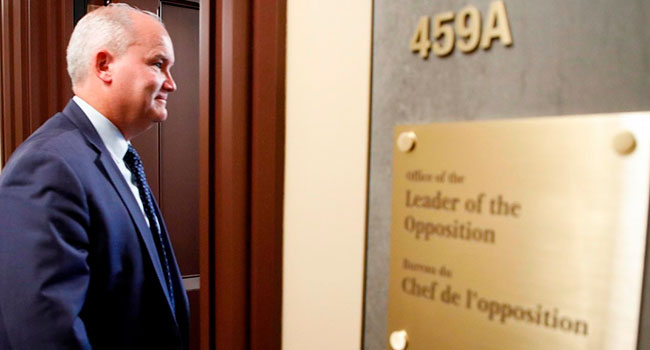 The federal Conservatives have a new leader. Erin O’Toole is the right choice.
The federal Conservatives have a new leader. Erin O’Toole is the right choice.
A former Veteran Affairs minister, O’Toole defeated another former Tory cabinet minister, Peter MacKay, on the third ballot by 57.02 per cent to 42.98 per cent.
It was an impressive win by O’Toole. The hard-working members of his team – including campaign manager Fred DeLorey, deputy campaign managers Jim Burnett and Melanie Paradis, chair of strategy Dan Robertson and campaign chair Walied Soliman – all played pivotal roles in this victory, too.
O’Toole established a balanced approach of fiscal and social conservative policies during this leadership campaign.
He united left-leaning Red Tories and right-leaning Blue Tories with a focus on free markets, private enterprise, reducing high taxes and supporting pertinent business issues to help our economy.
He wants to crack down on crime, supports a more muscular foreign policy plan, and was the first Tory leadership candidate to call for the shift of the Canadian embassy in Israel to Jerusalem.
O’Toole also championed more individual rights and freedoms, and respected the disparate views of party members on social issues. He wants to establish stable funding levels for health care and mental health, repeal the federal carbon tax, work with Quebec, and help individuals and families during COVID-19, among other policies.
In contrast, MacKay’s campaign came out strong at the starting gate and proceeded to completely collapse.
The longtime politician, who helped co-found the Conservative Party of Canada, has always been ensconced on the Tory centrist, or Red Tory, wing. MacKay touted some fiscal conservative policies but that’s never been his strong suit in politics. Rather, he’s always walked a fine line between appealing to conservatives and progressives, which is obviously a throwback to a political era that’s long since over in this country.
Nevertheless, some Tories, including former Reform/Alliance MPs, had become gun-shy due to departing leader Andrew Scheer’s struggles with media and public perception. They likely thought a perceived shift back to centrist themes and policies would help their electoral chances.
MacKay also briefly played the unnatural role (for a Tory) of a media darling.
Some Liberals claimed he was the leadership candidate they were most concerned about. Several middle-of-the-road NDP supporters said they would consider voting for him. The Toronto Star endorsed him in an Aug. 19 editorial as the “best person to take the Conservatives forward.”
In reality, most progressives and centrist activists weren’t fearful of a MacKay leadership. They were likely licking their chops at the possibility of running against him because he’s seen as error-prone and ideologically inconsistent – and could tear apart the Canadian conservative movement, which would be to their political advantage.
Liberal strategist Scott Reid’s Aug. 24 tweet thread included a rather telling section. “MacKay entered with all the endorsements, all the name recognition, all the structural advantages,” he wrote. “It should have been a slam for him. But MacKay – who has always seemed better at politics than he’s actually been at politics – made a ton of unforced errors and emerged blurry.”
That’s a description of MacKay’s political career that has haunted him for years.
As a rule of thumb, the key to success in politics is crafting a message that resonates with a particular audience. While this may sound easy on the surface, it’s not.
You have to get inside the deep, dark minds of party supporters and potential voters. You have to understand the semantics of historical and modern political and economic trends. You have to write or speak directly to an individual in language that’s easy for them to understand and identify with.
Moreover, you have to accept that party politics is evergreen and volatile. Ideas conceived during a political campaign might have to be dropped and/or restructured due to a sudden event and/or changing narrative.
What seems like an ironclad strategy today could be the equivalent of Silly Putty tomorrow.
O’Toole’s campaign, unlike MacKay’s, operated with intelligence, data and machine-like precision that won over a wide assortment of party supporters from coast to coast to coast.
That’s why the Conservatives chose him.
They made the right decision.
Michael Taube, a Troy Media syndicated columnist and Washington Times contributor, was a speechwriter for former prime minister Stephen Harper. He holds a master’s degree in comparative politics from the London School of Economics.
The views, opinions and positions expressed by columnists and contributors are the author’s alone. They do not inherently or expressly reflect the views, opinions and/or positions of our publication.
